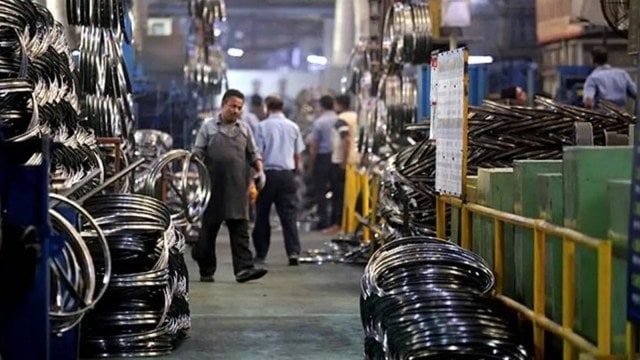Gujarat govt amends Factories Act; increased working hours, women in night shifts among key changes
The move aims to boost economic activities, attract investment in new projects and generate employment
 The key amendment includes increasing a worker’s maximum working hours from current nine hours to 12 hours with a cap of maximum 48 hours in a week. (Representative image)
The key amendment includes increasing a worker’s maximum working hours from current nine hours to 12 hours with a cap of maximum 48 hours in a week. (Representative image)The Gujarat government has promulgated an ordinance — Factories (Gujarat Amendment) Ordinance, 2025 — amending the Factories Act, 1948 allowing 12-hour work shifts, with a cap of 48 hours in a week and night shifts for women among others.
The Labour, Skill Development and Employment Department of the state government promulgated the ordinance on July 1 as the Gujarat Assembly is not in session. The ordinance states that it has been promulgated “to grant relaxation to the factories to boost economic activities, attract investment in national importance to new projects and generate employment”.
The key amendment includes increasing a worker’s maximum working hours from current nine hours to 12 hours with a cap of maximum 48 hours in a week; the ordinance has amended Section 54 of the principal legislation.
It requires a worker’s written consent to work for increased working hours.
The amended Section 54 reads, “…the State Government may by notification in the Official Gazette, extend the daily maximum hours of work…up to twelve hours inclusive of interval for rest in any day, subject to a maximum of forty-eight hours in any week as specified in Section 51, with respect to any group or class or description of factories on such conditions as it may deem expedient, subject to the written consent of such worker for such work, and the remaining days of the said week for the worker shall be paid holidays.”
Another amendment to the principal act enables the state government to extend the total number of hours of work of a worker without an interval from five to six hours due to the provision of flexibility in working hours in the amended Section 54 by issuing a notification. For overtime work, the worker is entitled to wages at the rate of twice his ordinary rate of wages.
In another important amendment to the principal Act, the ordinance has increased the cap on the total overtime work hours from 75 hours to 125 hours in a quarter. A clause has been added to the amendment saying, “a worker may be required to work for overtime subject to the written consent of such worker for such work.”
Another important amendment to the Factories Act, through the ordinance, allows women workers to work in night hours from 7 pm to 6 am with 16 conditions like duty of the employer to prevent or deter commission of acts of sexual harassment and to provide the procedures for the resolution, prosecutions of acts of sexual harassment by taking all steps required, to provide appropriate working conditions with respect to the work, leisure, health and hygiene to further ensure that there is no hostile environment towards women. Other conditions include providing proper lighting and CCTV coverage not only inside the factory, but also surrounding of the factory and to all places where the female workers may move out of necessity in the course of work, women workers not in a batch of less than 10, presence of women security, transport facility, etc.
It will not be compulsory for any woman to work in night shifts and a written consent will be obtained from the women who are interested in working the night shifts.
Headline: Terms and Conditions
- Employers are to prevent or deter the commission of acts of sexual harassment and to provide the procedures for the resolution, statement or prosecutions of acts of sexual harassment by taking all steps required.
- Provide appropriate working conditions in respect of the work, leisure, health and hygiene to ensure that there is no hostile environment towards women at workplaces.
- Maintain a complaint redressal mechanism in the factory itself and the said mechanism shall ensure time-bound treatment of complaint.
- Provide proper lighting and CCTV coverage not only inside the factory, but also surrounding of the factory and to all places where the female workers may move out in the course of work. Storage of CCTV footage for at least 45 days.
- To ensure that the women workers are employed in a batch not less than 10.
- Provide sufficient security including women guards during the night shift at the entry and exit point.
- Sufficient number of restrooms for the female workers to arrive in advance and also leave after the working hours.
- Transportation facility to the women workers from their residence and back (for night shift). Each transportation vehicle to be equipped with CCTV camera and GPS.
- Obtain bio-data of each driver and conduct pre employment screening of the antecedents of all drivers employed on their own. If the drivers are employed through outsourcing, the employer shall ensure to its satisfaction that the collection of bio-data and conduct pre-employment screening of the antecedents of the drivers is carried out by the service provider.
- The telephone number, particularly mobile phone numbers, email ID and address of the women employees shall not be disclosed to unauthorised persons.
- Careful selection of routes in such a way that no women employees shall be picked up first and dropped last.
EDOT
The latest ordinance bringing in amendments to the Factories Act has been promulgated considering the aspect of gender equality and requirement of the industry and workers both, official sources said. A senior government functionary said, “With certain conditions, women used to work in factories up to 10 pm. The statutory total embargo period on employing women was between 10 pm and 5 am. However, there were demands from both — the workers and the industry — to allow women to work in night shifts as well and to increase the work hours. There are certain tasks for which the woman workforce is more suitable. So, these relaxations have been brought in with strict safety protocol.”
Another senior officer said, “We have considered the gender equality aspect as well. Gone are the days when women were not working night shifts. Today, women are as independent as men.”












